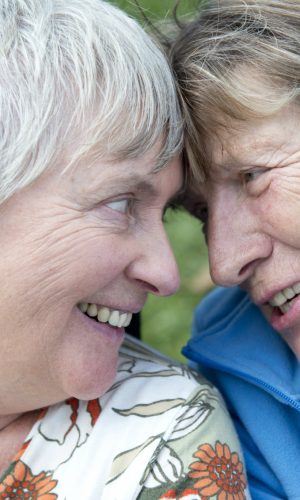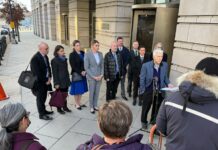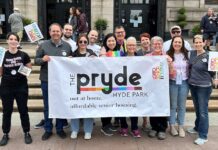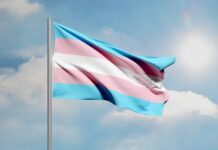Discrimination rears its head as elder LGBTs seek assistance; Maine and Massachusetts activists call for action
More than a year ago, John Hennessey received a phone call from a 57-year-old disabled man in northern Maine whose care giver had recently discovered he was gay and was subsequently threatening to out him to his small rural community. Hennessey, Advocacy Director at AARP Maine, is neither a service provider, nor a social worker, but as a gay man, he says, a red flag was raised.
“He told me he hadn’t been out of his house for three weeks because he was afraid that his care giver had already told people he was gay. The anxiety and fear in his voice was coming through loud and clear,” says Hennessey. “The more I talked to him, the more it dawned on me that there must be more people struggling with this same scenario in Maine.”
For Hennessey, that phone call was the catalyst for a report in collaboration with SAGE — Services and Advocacy for GLBT Elders released in March: “Gay, Lesbian, Bisexual and Transgender (GLBT) Aging in Maine Community Needs Assessment.”
“In general, the report validates everything that we already know to be true and reveals some opportunities,” says Hennessey, who is now advocating for a SAGE chapter in Maine. “Essentially, we discovered that GLBT people are facing many of the same challenges as everyone else as they get older, but it also shows that GLBT adults experience much more isolation and discrimination which often forces them to go back into the closet that they worked their entire lives to escape.”
 Maine is the most recent state to allow gay marriage, and the first in the nation to have the law approved by a majority of voters at the polls. Following the passage of the gay marriage law, many in the state have wondered: “What’s next?” After all, marriage is the default panacea of gay rights, and Maine ranks in the top ten states in the nation for gay-friendly laws. Another distinction? Maine has the oldest population in the U.S. with more than 300,000 elders age 60 and over. It is estimated that 15,000 of them are gay, lesbian, bisexual or transgender. For many, the reality of old age comes, hits when one is faced with the reality of what it means to be senior.
Maine is the most recent state to allow gay marriage, and the first in the nation to have the law approved by a majority of voters at the polls. Following the passage of the gay marriage law, many in the state have wondered: “What’s next?” After all, marriage is the default panacea of gay rights, and Maine ranks in the top ten states in the nation for gay-friendly laws. Another distinction? Maine has the oldest population in the U.S. with more than 300,000 elders age 60 and over. It is estimated that 15,000 of them are gay, lesbian, bisexual or transgender. For many, the reality of old age comes, hits when one is faced with the reality of what it means to be senior.
“ He told me that now that that his partner is gone, he can’t bear to be alone for the rest of his life and that, if he was gay, he could never go into a senior center. So, he just decided that he would no longer be gay,. These accounts just tear your heart out. ”
Bob Linscott, Assistant Director at The LGBT Aging Project in Massachusetts
Dr. Erica Magnus, a volunteer with the AARP, has been caring for her 90-year-old mother with the help of her partner of 25 years. By Magnus’s account, her mother receives a remarkable level of care. “Without us she would be in a nursing home because her needs really outweigh her ability to live on her own,” says Magnus. “I think caring for my mother all these years has really opened my mind to preparing for life as we age.”
However, when Magnus read the report and the accounts of those who are now scared to be out when entering an institution, she says it was a real “eye opener.”
“The statistics are scary,” she says. “I hope if I one day need the care that she needs now, I want to know that I can be who I am without being afraid.”
According to Bob Linscott, Assistant Director at THE LGBT Aging Project in Massachusetts, the situation in Maine is not unique. He points to the story of elderly man in a rural area near Worcester who had been with his now-deceased partner for close to 40 years. At the time of his partner’s death, the man was connected by Linscott with a case worker to provide support. However, rather than navigate elder care as a gay man, the senior simply decided to “no longer be gay.”
“He told me that now that his partner is gone, he can’t bear to be alone for the rest of his life and that, if he was gay, he could never go into a senior center. So, he just decided that he would no longer be gay,” says Linscott. “These accounts just tear your heart out.”
Linscott’s group recently joined MassEquality to advocate for an LGBT Elder Commission to study and recommend ways to meet the unique needs of gay seniors in the Bay State.
“Despite having an excellent elder care system in Massachusetts, we frequently encounter providers who claim they don’t have any LGBT constituents,” said Lisa Krinsky, LGBT Aging Project Executive Director. “There is a great need for this Commission so we can learn more about this invisible population and their unique experiences and needs in order to ensure that LGBT elders feel safe and comfortable.”
Multiple surveys distributed by SAGE, the National Gay and Lesbian Task Force, and the LGBT Aging Project have shown that LGBT elders have a great need for services to help them to continue living independently as they age, but that they are also unlikely to request such services: approximately 3.8-7.6% of the total elder population is LGBT, and this is expected to double by 2030 as the baby boomers, the first generation of post-Stonewall, openly LGBT older adults continues to age
“This is truly the next crisis for us to come together on. Gay seniors become alone again at a much higher rate than straight peers. All of the support that most people take for granted in terms of children, grandchildren, and other social networks as they go into a senior center or a community center, all those things are often stripped away,” says Linscott. “All of the fears of what the world was like when they were coming of age comes roaring back, and it’s pervasive.”
“ This is truly the next crisis for us to come together on. Gay seniors become alone again at a much higher rate than straight peers. All of the support that most people take for granted in terms of children, grandchildren, and other social networks as they go into a senior center or a community center, all those things are often stripped away.”
Bob Linscott, Assistant Director at The LGBT Aging Project in Massachusetts
The answer? Education in the form of cultural competency training for care givers and awareness for other elders. “Care givers need to understand that they are tasked with providing the most and best compassionate care,” says Linscott. “As for peers, their attitudes toward the LGBT community have marinated for 70 years or more, but we know that things change when you put a face to it.”
In fact, Linscott, who left his home state of Maine in the ‘80s because of his own feelings of isolation, credits some of the support for gay marriage in New England to the stories of those couples who have been together for 40 or more years and speak publicly about the impact legal marriage would have on their lives. Now, he says, it’s time to shine a brighter light on what it means to be old and alone — for many, for the first time in decade.
Hennessey, a long time gay rights advocate, agrees.
“In many cases, these people have fought for independence and for their identity their entire lives. The notion of going back into the closet is anathema to them, and yet that often becomes their only option when they enter care,” says Hennessey. “We need to reach out to them and let them know it’s ok. And, it will be okay because there is an opportunity to make these places non-threatening while helping straight people understand what it means, or doesn’t mean, to have gay people in their midst.” [x]









